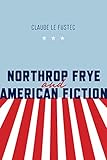Northrop Frye and American Fiction / Claude Le Fustec.
Material type: TextPublisher: Toronto : University of Toronto Press, [2014]Copyright date: ©2014Description: 1 online resource (248 p.) : 2 figuresContent type:
TextPublisher: Toronto : University of Toronto Press, [2014]Copyright date: ©2014Description: 1 online resource (248 p.) : 2 figuresContent type: - 9781442647695
- 9781442668935
- 813/.5409 23
- PS379
- online - DeGruyter
| Item type | Current library | Call number | URL | Status | Notes | Barcode | |
|---|---|---|---|---|---|---|---|
 eBook
eBook
|
Biblioteca "Angelicum" Pont. Univ. S.Tommaso d'Aquino Nuvola online | online - DeGruyter (Browse shelf(Opens below)) | Online access | Not for loan (Accesso limitato) | Accesso per gli utenti autorizzati / Access for authorized users | (dgr)9781442668935 |
Browsing Biblioteca "Angelicum" Pont. Univ. S.Tommaso d'Aquino shelves, Shelving location: Nuvola online Close shelf browser (Hides shelf browser)

|

|

|

|

|

|

|
||
| online - DeGruyter Spanish Female Writers and the Freethinking Press, 1879-1926 / | online - DeGruyter Commissions of Inquiry and Policy Change : A Comparative Analysis / | online - DeGruyter Land, Stewardship, and Legitimacy : Endangered Species Policy in Canada and the United States / | online - DeGruyter Northrop Frye and American Fiction / | online - DeGruyter The Sense of Power : Studies in the Ideas of Canadian Imperialism, 1867-1914, Second Edition / | online - DeGruyter My Havana : The Musical City of Carlos Varela / | online - DeGruyter A Great Rural Sisterhood : Madge Robertson Watt and the ACWW / |
Frontmatter -- Contents -- Acknowledgments -- Abbreviations -- Introduction: Re-enchantment, Postsecularity, and the Return of Transcendence in Western Culture -- 1. The Scarlet Letter: Puritan Imagination and the Kerygmatic Power of Sin -- 2. Henry James’s The Europeans: Secularity and the Descent of the Word -- 3. Fitzgerald’s The Great Gatsby: Modernism and the Death of the Word -- 4. Immanent Christianity in The Grapes of Wrath -- 5. “In the Name of the Lost Father”: Postsecular Mysticism in On the Road -- 6. “I Will Call Them My People”: Toni Morrison’s Postsecular Gospel of Self and Community -- Conclusion: Kerygma and the Promises of Postsecular Imagination in Postmodern Times -- Notes -- Bibliography -- Index
restricted access online access with authorization star
http://purl.org/coar/access_right/c_16ec
Northrop Frye and American Fiction challenges recent interpretations of American fiction as a secular pursuit that long ago abandoned religious faith and the idea of transcendent experiences. Inspired by recent philosophical thinking on post-secularism and by Northrop Frye’s theorizing on the connections between the Bible and the development of Western literature, Claude Le Fustec presents insightful readings of the presence of transcendence and biblical imagination in canonical novels by American writers ranging from Nathaniel Hawthorne to Toni Morrison.Examining these novels through the lens of Frye’s ambitious account of literature’s transcendent, or kerygmatic power, Le Fustec argues that American fiction has always contained the seeds of a rejection of radical skepticism and a return to spiritual experience. Beyond an insightful analysis of Frye’s ideas, Northrop Frye and American Fiction is powerful testimony of their continued interpretive potential.
Mode of access: Internet via World Wide Web.
In English.
Description based on online resource; title from PDF title page (publisher's Web site, viewed 01. Dez 2023)


